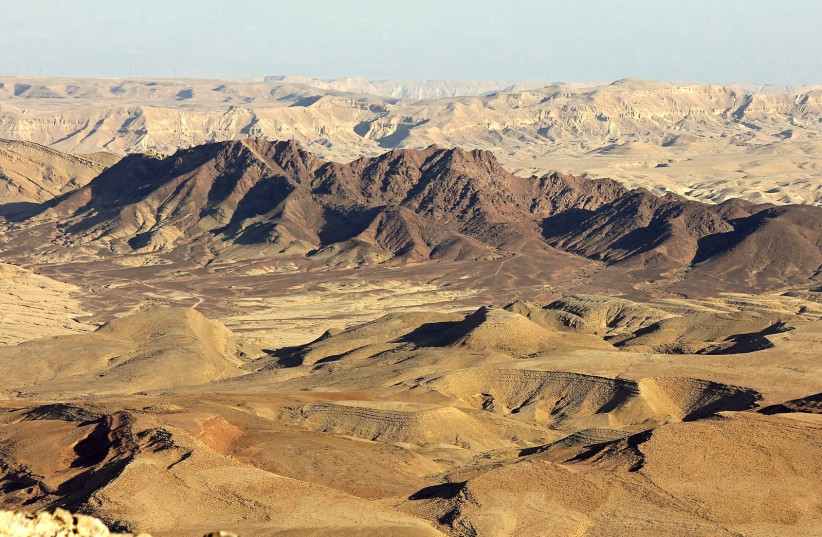Sand Flakes is a heartfelt and moving coming-of-age story about a teenage boy who aspires to be a writer, and his mother, who gave up on her own ambitions years ago and now suffers from a crippling illness. The son writes short stories – dramatized in beautiful animations – which are a thinly veiled version of his mother’s life, and begins to come to terms with his family and himself.
The film is a straightforward story of several complicated lives and deftly tackles some rarely discussed issues of class and status in Israel. David (Yonatan Lahav-Weisberg) is a teen who lives with his parents and little brother in a small apartment in the Negev. His life has been shaped by the fact that his mother, Iris (Shani Cohen), contracted multiple sclerosis years ago and insisted the family leave Tel Aviv and return to Dimona, where she grew up.
His father Michael (Ori Pfeffer) works at a Dead Sea factory and is so distant from the family that he listens to music when he sits down to dinner and prefers not to talk to anyone.
David is responsible for the day-to-day care of his mother, who gets around with a cane but sometimes is so weak she can barely sit up and even needs a wheelchair. This includes doing much of the work of raising Shlomi (Elay Amodi), his little brother.
Iris’s sister (Lucy Aharish), helps out, but the one who needs to make sure the household is running is David. It is a heavy burden for a young boy to bear. Big David (Yossi Marshek), his mother’s first love, is still hanging around, spending his days on the roof of their building, hoping he will be needed to help Iris.

This complicated situation drives the sensitive teen to try to cope with his life by writing stories about his mother, looking at the world from her point of view. In the poetic stories, which are almost like fables, he tries to understand why she gave up on her own ambitions to move back to Dimona once she became ill. He tries to grasp the complexities of his parents’ marriage, ever hopeful that they will work out their problems. He is boundlessly disappointed, as only a teenager can be, when they don’t.
Not only does he create these stories, but he also shares them on a teen writers’ group. He falls for a girl in the group he chats with, who has read his stories and thinks he is very talented.
But soon it becomes clear that he has told some puzzling lies. He has told the group that his name is Nadav and that he is from Kfar Saba, a town in the center of the country, which to him seems cooler than saying he has a biblical name and lives in the Negev. She keeps inviting him to the group’s events in Tel Aviv, but David does not go, both because he has to take care of his brother and, of course, because he is scared to reveal his lies.
Everything in his life spirals toward a crisis as the movie progresses. Big David tries to become a stronger presence in his mother’s life, but his mother resists doing the physical therapy that may help her regain some mobility. His father grows angrier and more distant. All this is happening just as David’s writers’ group is about to attend a convention in Tel Aviv.
Sand Flakes stands out with Negev setting
THERE HAVE been many coming-of-age movies, but Sand Flakes distinguishes itself through its Negev setting, which is shown as starkly beautiful as well as isolated, and its literary storyline and narration.
Interestingly, given that it is a movie that concentrates so much on a mother-son relationship, the movie was co-directed by a mother, Gitit Kabiri, and her son, Yahel Kabiri, with a script by Gitit. There are many brother-directing duos, such as the Dardenne brothers, who were just given an award at the Jerusalem Film Festival, and a handful of sister directors. But this is the first time I can remember encountering a mother-son partnership, and it seems to have worked well.
The story is told from both the mother’s and the son’s points of view, and both are sensitively portrayed. That makes the story more effective and interesting than the typical coming-of-age story that is only told from the point of view of the misunderstood hero.
Several outstanding performances make the movie work. Cohen, who is best known as a wonderful comedian on Eretz Nehederet, has become one of Israel’s most interesting dramatic actresses in recent years. This is the most complex role I have seen her in so far.
She projects a strong will, as well as confusion and vulnerability, in a role in which she doesn’t have big speeches, but is able to convey much with relatively few words.
She has key dramatic roles in Line in the Sand, a police drama series currently running on television, and also has a key role in Avi Nesher’s upcoming film, The Monkey House. Lahav-Weisberg, making his movie debut as David, is very natural and completely credible as a talented but troubled boy.
Sand Flakes gives a new spin on the timeless coming-of-age trope and will appeal to audiences who enjoy low-key human drama.
